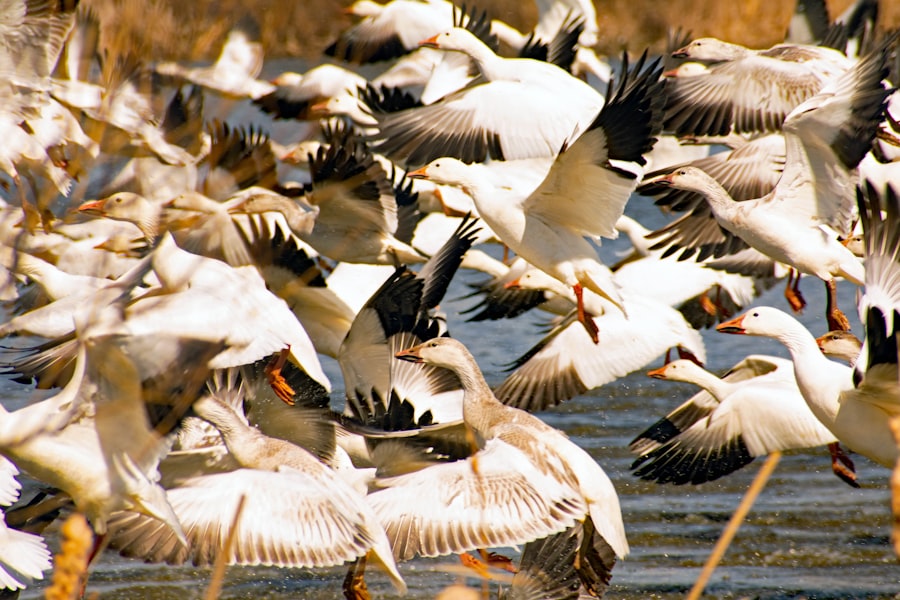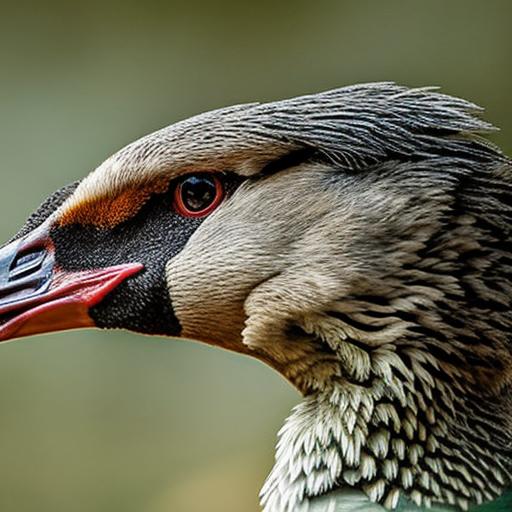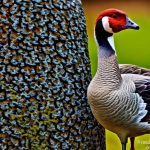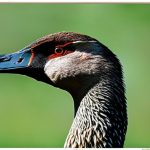Geese are fascinating and versatile animals that have captured the attention of humans for centuries. They are known for their distinctive honking sound, graceful flight, and strong sense of loyalty. Geese can be found in various habitats around the world, from wetlands and lakes to farms and homesteads. They have been domesticated for thousands of years and have become beloved pets, natural alarm systems, pest controllers, sources of food, symbols of wealth, therapy animals, companions for other farm animals, and even subjects of art and literature. In this article, we will explore the many roles that geese play in our lives and the unique qualities that make them such remarkable creatures.
Key Takeaways
- Geese make loyal and protective pets.
- Geese are natural alarm systems for farms and homesteads.
- Geese are effective pest control for gardens and crops.
- Geese are a source of meat and eggs in traditional cuisines.
- Geese are a symbol of wealth and status in some cultures.
Geese as loyal and protective pets
Geese are not your typical household pets, but they can make wonderful companions for those who are willing to invest time and effort into their care. Geese are known for their loyalty and protective nature, often forming strong bonds with their human caretakers. They can be trained to recognize their owners and will often follow them around like a faithful dog.
One personal anecdote comes from a farmer named John who had a pet goose named Charlie. Charlie would greet John every morning with a loud honk and would follow him around the farm all day long. Whenever a stranger approached, Charlie would puff up his feathers and let out a warning honk, alerting John to the potential threat. This loyalty and protective instinct make geese excellent guard animals for farms and homesteads.
In addition to their loyalty, geese are also highly intelligent animals. They can learn simple commands and tricks, making them engaging pets to interact with. However, it is important to note that geese can be territorial and aggressive towards strangers or other animals if they feel threatened. Proper training and socialization are essential to ensure that geese behave appropriately in different situations.
Geese as natural alarm systems for farms and homesteads
Geese have been used as natural alarm systems for centuries, particularly on farms and homesteads. Their keen sense of hearing and loud honking make them excellent at alerting farmers to potential threats or intruders. Geese have a natural instinct to protect their territory and will often sound the alarm if they sense something out of the ordinary.
One example of geese being used as alarm systems comes from ancient Rome. Roman soldiers would keep geese in their camps as a way to detect approaching enemies. The geese would honk loudly if they sensed any danger, giving the soldiers time to prepare for an attack. This practice was so effective that it became a common strategy in Roman military camps.
In modern times, geese are still used as alarm systems on farms and homesteads. Their loud honking can deter potential thieves or predators, alerting the farmer to the presence of danger. Geese are particularly effective at detecting intruders at night when their senses are heightened. Their honking can also serve as a deterrent, as many people are wary of approaching a property with loud and protective geese.
Geese as effective pest control for gardens and crops
Geese are not only loyal pets and natural alarm systems, but they also serve as effective pest control for gardens and crops. They have a natural instinct to forage for food, and their diet consists mainly of grass, weeds, insects, and small rodents. This makes them excellent at controlling pests that can damage crops or gardens.
One benefit of using geese for pest control is that they are a natural and environmentally friendly alternative to harmful chemicals. Many pesticides and herbicides can be toxic to humans and other animals, but geese provide a safe and sustainable solution. They can help control pests without the need for harmful chemicals, making them an ideal choice for organic farmers or those who want to minimize their impact on the environment.
Geese are particularly effective at controlling pests in large open areas, such as pastures or orchards. They will graze on grass and weeds, reducing the need for mowing or manual weeding. Geese also have a keen eye for spotting insects and small rodents, which they will eagerly consume. This natural pest control can help farmers and gardeners reduce crop damage and increase yields without the use of harmful chemicals.
Geese as a source of meat and eggs in traditional cuisines
Geese have been used for food throughout history and are still enjoyed in many traditional cuisines around the world. Goose meat is known for its rich flavor and tender texture, making it a popular choice for special occasions or festive meals. Goose eggs are also prized for their large size and rich taste, often used in baking or as a substitute for chicken eggs.
In many cultures, goose meat is a traditional dish served during holidays or celebrations. For example, in Germany, roast goose is a popular Christmas dish. The goose is typically stuffed with apples, onions, and herbs, then roasted until the skin is crispy and the meat is tender. In France, goose liver pâté, known as foie gras, is considered a delicacy and is often served on special occasions.
Goose eggs are also highly valued in certain cuisines. In Russia, pickled goose eggs are a popular snack or appetizer. The eggs are boiled, then soaked in a brine solution flavored with spices and herbs. In China, salted goose eggs are often used in mooncakes, a traditional pastry eaten during the Mid-Autumn Festival.
Geese as a symbol of wealth and status in some cultures

In certain cultures, geese have been associated with wealth and status. Their graceful appearance and regal demeanor have made them symbols of power and prestige. In ancient Rome, geese were considered sacred to the goddess Juno and were often depicted in artwork and sculptures as a symbol of wealth and abundance.
One example of geese being used to display wealth or power comes from ancient Egypt. The pharaohs would often keep geese in their palaces as a sign of their status. Geese were considered a luxury food item, and only the wealthy elite could afford to keep them. The presence of geese in a household was seen as a symbol of prosperity and abundance.
In modern times, geese are still associated with wealth and status in certain cultures. In some Asian countries, such as China and Japan, geese are considered a symbol of good luck and prosperity. Geese are often depicted in artwork or given as gifts to bring good fortune to the recipient.
Geese as therapy animals for people with disabilities or mental health issues
Geese can also serve as therapy animals for people with disabilities or mental health issues. Their calm and gentle nature can provide comfort and companionship to those in need. Geese have been used in animal-assisted therapy programs to help individuals with physical, emotional, or cognitive disabilities improve their well-being.
One example of geese being used as therapy animals comes from a program in the Netherlands called “Geese on the Move.” This program pairs individuals with autism or other developmental disabilities with a trained therapy goose. The participants learn how to care for the goose, including feeding, grooming, and training. The presence of the goose helps to reduce anxiety and improve social skills.
Geese can also provide therapeutic benefits for individuals with mental health issues such as anxiety or depression. Their calming presence and non-judgmental nature can help reduce stress and promote relaxation. Many therapy programs incorporate interactions with geese, such as walking or sitting near them, as a way to improve mental well-being.
Geese as companions for other farm animals, such as horses or cows
Geese can be excellent companions for other farm animals, such as horses or cows. Their social nature and protective instincts make them a valuable addition to a farm or homestead. Geese can form strong bonds with other animals and provide them with companionship and protection.
One benefit of having geese as companions for other farm animals is their ability to detect potential threats. Geese have a keen sense of hearing and will often sound the alarm if they sense danger. This can help protect other animals from predators or intruders. Geese are particularly effective at detecting aerial threats, such as hawks or eagles, and will often honk loudly to warn other animals of their presence.
Geese can also provide companionship and social interaction for other farm animals. They are highly social creatures and will often form bonds with other animals in their environment. Geese have been known to groom and preen other animals, such as horses or cows, which can help improve their overall well-being.
Geese as intelligent and social creatures with unique personalities
Geese are not only loyal, protective, and social animals, but they are also highly intelligent creatures with unique personalities. They have complex social structures and communicate with each other through a variety of vocalizations and body language. Geese are capable of forming strong bonds with their human caretakers and can recognize individual faces and voices.
One example of geese displaying their intelligence and unique personalities comes from a study conducted by Konrad Lorenz, an Austrian zoologist. Lorenz found that geese have a strong imprinting instinct, meaning they form attachments to the first moving object they see after hatching. In his study, Lorenz acted as the mother goose for a group of goslings. The goslings imprinted on Lorenz and followed him around as if he were their mother.
Geese also have unique behaviors that reflect their intelligence and social nature. For example, geese will often form a “V” formation when flying in a flock. This formation allows them to conserve energy by taking advantage of the updraft created by the bird in front of them. Geese will take turns leading the flock, with the lead bird dropping back to the rear when it becomes tired.
Geese as a popular subject in art, literature, and folklore
Geese have long been a popular subject in art, literature, and folklore. Their graceful appearance and distinctive honking sound have made them a source of inspiration for artists and writers throughout history. Geese are often depicted in paintings, sculptures, and other forms of artwork as symbols of beauty, grace, and freedom.
One famous work of art that features geese is “The Goose Girl” by Jean-Baptiste Greuze. This painting depicts a young girl holding a goose in her arms, symbolizing innocence and purity. The goose is shown looking up at the girl with a sense of trust and companionship.
Geese are also featured prominently in literature and folklore. In Aesop’s fables, geese are often portrayed as wise and intelligent creatures. One famous fable tells the story of “The Goose That Laid the Golden Eggs,” in which a farmer becomes greedy and kills the goose in an attempt to get all of its golden eggs at once.
In folklore, geese are often associated with migration and the changing seasons. In many cultures, the sight of geese flying in formation is seen as a sign that winter is approaching or that spring is on its way. Geese are also associated with loyalty and fidelity, often depicted as symbols of love and devotion.
Geese as a reminder of the beauty and diversity of the natural world
In conclusion, geese are fascinating and versatile animals that play many important roles in our lives. They are loyal and protective pets, natural alarm systems, effective pest controllers, sources of food, symbols of wealth, therapy animals, companions for other farm animals, and even subjects of art and literature. Geese are intelligent and social creatures with unique personalities, and their presence reminds us of the beauty and diversity of the natural world.
It is important to appreciate and respect the role that geese play in our lives and to ensure their well-being. Whether they are serving as loyal pets, protecting our farms, controlling pests, providing food, or offering companionship and therapy, geese deserve our admiration and care. By understanding and valuing the versatility and importance of geese, we can foster a deeper connection with the natural world and the diverse creatures that inhabit it.
If you’re curious about why people keep geese, you might find this article on “How to Care for Goslings” from Poultry Wizard quite interesting. Geese can make wonderful additions to a backyard flock, and understanding how to properly care for their young is essential. From providing the right diet to creating a safe and comfortable environment, this article covers all the basics of raising healthy goslings. So, if you’re considering adding geese to your poultry collection, be sure to check out this informative resource. And while you’re at it, don’t forget to explore other helpful articles on Poultry Wizard, such as “Heater for a Chicken Coop” and “Do Quails Sit on Their Eggs?”
FAQs
What are geese?
Geese are waterfowl birds that belong to the family Anatidae. They are known for their long necks, webbed feet, and distinctive honking sound.
Why do people keep geese?
People keep geese for a variety of reasons, including as pets, for meat and eggs, as guard animals, and for their feathers.
What are the benefits of keeping geese?
Keeping geese can provide a source of food, feathers, and income. They can also help control pests and weeds in gardens and fields.
What are the challenges of keeping geese?
Geese can be noisy and messy, and require a lot of space to roam. They can also be aggressive towards humans and other animals.
What do geese eat?
Geese are herbivores and primarily eat grass, weeds, and other vegetation. They may also eat insects and small animals on occasion.
How long do geese live?
Geese can live up to 20 years in captivity, but their lifespan in the wild is typically shorter due to predation and other factors.
What are some common breeds of geese?
Common breeds of geese include the Toulouse, Embden, Chinese, and African. Each breed has its own unique characteristics and uses.
Meet Walter, the feathered-friend fanatic of Florida! Nestled in the sunshine state, Walter struts through life with his feathered companions, clucking his way to happiness. With a coop that’s fancier than a five-star hotel, he’s the Don Juan of the chicken world. When he’s not teaching his hens to do the cha-cha, you’ll find him in a heated debate with his prized rooster, Sir Clucks-a-Lot. Walter’s poultry passion is no yolk; he’s the sunny-side-up guy you never knew you needed in your flock of friends!







